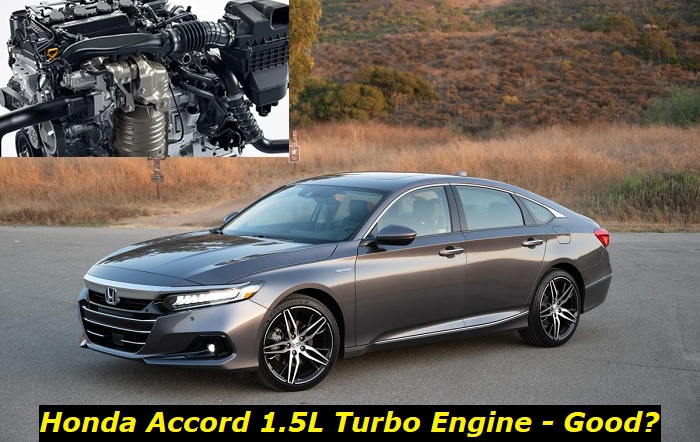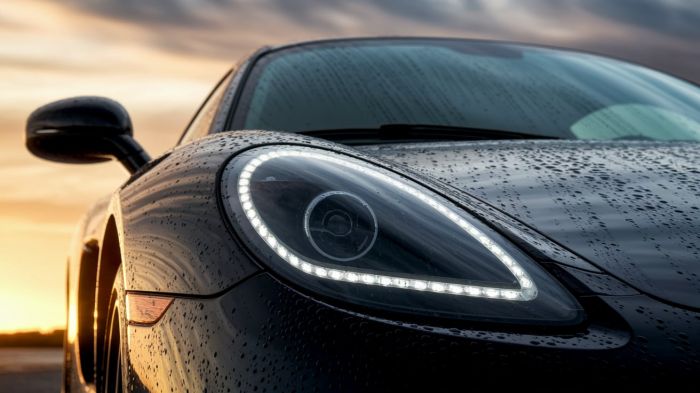Over the years, the demand for the Honda Accord has been primarily driven by its reliability and high level of quality over its direct rivals in the market. However, it seems the 2022 Honda Accord has been having a rough start with its owners because of the plethora of problems associated with its 1.5L Turbocharged VTEC engine.
In this article, we will see the factors that have been instigating the negative publicity of this engine. The common problems of the vehicle that you should watch out for are also listed here to help you detect and fix them early on.

Key features and my opinion about the engine
- Production years:2017-now
- Average lifespan of L15BE:160,000-180,000
- Fuel supply type:direct injection
- Power range:190-192 hp
- Fuel efficiency:good
- Engine block material:aluminum
- Engine reliability score:medium
- The most common problems:ignition system problems, turbocharger issues, extensive wear due to aggressive use.
2022 Honda Accord 1.5L Turbocharged Engine Longevity
By 2022, the Honda Accord has been using the 1.5L Turbo L15BE engine for four years already. That should have been enough time for its maker to smoothen out the problems that plagued its early builds. However, it's sad to note that most of them persist at the present, which we will cover in the next section of this article.
The 1.5L engine of the Honda Accord has been carrying infamy over the years mainly because of its underperforming turbo. Add to that the issues that should only be taking place on aging engines like major carbon build-up accumulation as well as engine oil dilution, and its long-term ownership is definitely worth thinking over.
Honda promises 200,000 miles for this power unit before it eventually requires expensive repairs or replacement. However, with the said major problems occurring too soon, we doubt that it will even be the case. With much luck, extraordinary care, and taking the issues head-on before they cause major damage to the engine, you may be fortunate to stretch it beyond 100,000 miles.
Most Common Problems Found in the 2022 Honda Accord 1.5L Turbocharged Engine
According to product reviews, reports, and the most common complaints coming from 2022 Honda Accord users, the 1.5L turbocharged engine of the car is prone to the following issues:
1. Too Much Turbo Lag
Turbo lag is the delay or slower throttle response that you can normally feel when driving a turbocharged car. It happens before the turbocharger kicks in and provides extra power to your engine.
This is fairly normal because of the time it takes for the pressure from the exhaust system to build up to the required level to spin the turbine inside the turbocharger. When a turbo reaches the necessary speed, which is known as spooling up, only then it can begin to drive more air and fuel into the engine.
The compact turbocharger used by the 1.5L L15BE engine of the 2022 Honda Accord is supposed to have less turbo lag than the bigger ones used by high-performance or utility vehicles with more displacement. However, a lot of users have been complaining about getting more lag than what they bargained for in the Accord.
While the major turbo lag in the Accord 1.5L engine can be primarily blamed on the way it is designed, there are things that you should watch out for when experiencing this in a more serious manner than usual.
First, check your vehicle's manual to see what the recommended psi or bar is for your Accord 1.5L turbocharged engine. If it is significantly lower than the one specified, then you might have a problem with your wastegate.
A wastegate is a valve that controls the amount of exhaust gases that flow through the turbine. If it is not functioning properly, it can cause the turbine to spin too slowly and result in turbo lag.
Another possibility is that your intercooler might be dirty or damaged. The intercooler is responsible for cooling the air that enters the engine after being compressed by the turbocharger. If it is not working properly, the air will be heated up and will not be able to provide the same level of power.
Lastly, your turbocharger itself might be damaged. If you can hear strange noises coming from it or if there is a noticeable drop in power, then it is possible that your turbocharger needs to be replaced.
If you are experiencing any of these problems, it is best to take your car to a mechanic and have it checked as soon as possible. Turbo lag can be frustrating, but it is nothing compared to the damage that a malfunctioning turbocharger can cause to your engine.
2. Engine Oil Dilution
The Accord 1.5L engine is notorious for having an oil dilution issue. This happens when the fuel simply finds its way into the oil, and the substances mix to make a mess. This will result in poor oil performance since the oil will lose the lubricating properties that allow the smooth movement of the pistons and bearings.
The fuel will also act as a solvent, which can break down the oil and cause sludge to form. The oil light may come on, or you might notice that the oil level is low on the dipstick. You might see white smoke coming from the exhaust or notice that the car is running rougher than usual, too. If you think you might have this problem based on the said signs, take your car to a mechanic to get it checked out.
There are a few ways to solve this problem. The first is to do an oil change and use a higher quality oil that has additives that will help to prevent fuel from getting into the oil. You can also have the injectors cleaned or replaced if they are triggering the issue. Likewise, have the oil lines checked for potential leaks and replace any gasket, seals, hoses, or cracked parts that may be making oil ooze out on the other parts of the engine bay. Lastly, if the problem is so severe, you might need to have the engine rebuilt.
The best way to avoid this predicament is to have regular maintenance done on your car and to change the oil regularly. This will help to keep the engine clean and prevent fuel from getting into the oil in the first place. If you do have this problem, make sure to get it fixed as soon as possible to avoid any damage to your engine.
3. Carbon Build-Up
Carbon build-up is a normal occurrence in engines. Performance issues in aging engines can be mostly traced to this issue. Since we are talking of the recently-released 2022 model of the Accord though, this should not be the main concern yet because it is expected to be carrying relatively new filters and parts that are fresh from the assembly plant.
There may be instances where this can happen to a new engine, however, like if the car is driven too roughly or too often in short distances where the engine does not heat up enough to evaporate moisture. Excessive idling, low-quality gas, and driving in dusty conditions are other reasons for carbon build-up.
When there is already an excessive amount of carbon deposits in the combustion chamber and on valves, it can cause poor compression, pre-ignition, and pinging. These can lead to power loss, decreased fuel economy, and a rougher idle. In extreme cases, it can cause engine failure.
To check if an engine has this problem, you will need a compression test kit. If the readings are low, then that could be an indication of carbon build-up. Other symptoms are hard starting, misfiring, and a drop in power.
If you do find that there is an issue with carbon build-up, the first thing to do is to clean the injectors. This can be done at a professional shop or with a cleaning kit that can be bought online or from auto parts stores.
Follow the instructions on how to use the kit properly. If the problem persists after cleaning the injectors, then it is time to have the combustion chamber and valves cleaned. This is best done by a professional as well.
Prevention is always better than cure so to avoid this problem, make sure to use good-quality gas and change your car's oil regularly. Drive the car at highway speeds for at least 30 minutes once in a while to help evaporate moisture. And have the injectors cleaned every 20,000 miles or so.
Carbon build-up is not something that can be fixed overnight so be patient and follow the steps above to get your car running smoothly again, or better, have a professional do it for you at your convenience.
2022 Honda Accord 1.5L Turbocharged Engine Key Specs
The Honda Accord model began adopting the 1.5L L15BE turbocharged engine in 2018. The LX, EX, EX-L, Touring, and Sport trims in its 10th-generation series were the initial beneficiaries of the engine. As of 2022, it was streamlined to include only the LX, Sport, Sport LE, and EX-L variants.
The 1.5-liter Turbo engine with the moniker "L15BE" features its maker's signature Variable Valve Timing & Lift Electronic Control (VTEC) technology. Basically, it's comparable to the one found in the CR-V.
The engine offers 20.2 psi of turbo boost and the integration of the VTEC technology on the exhaust side, among other improvements. This marked the first time for the VTEC to be integrated into the 1.5-liter Turbo engine. The new setup aims to enhance performance over the rev range with the help of VTC to improve scavenging in the engine. The other revisions on the exhaust manifold design further aid in the smooth flow of exhaust to the turbocharger resulting in more economical operation and improved response at low RPMs.
Overall, the configuration allows the car to deliver up to 192 hp at 5,500 rpm and 192 lb-ft of torque at 1,600 to 5,000 rpm.
Conclusion
With the flak that the 1.5L Turbo engine of the 2022 Honda Accord has been getting as of late, it may be hard for it to live on the legacy that its series has established over the years. That's unless its maker does something about the 2023-year model offerings of the range.
About the authors
The CarAraC research team is composed of seasoned auto mechanics and automotive industry professionals, including individuals with advanced degrees and certifications in their field. Our team members boast prestigious credentials, reflecting their extensive knowledge and skills. These qualifications include: IMI: Institute of the Motor Industry, ASE-Certified Master Automobile Technicians; Coventry University, Graduate of MA in Automotive Journalism; Politecnico di Torino, Italy, MS Automotive Engineering; Ss. Cyril and Methodius University in Skopje, Mechanical University in Skopje; TOC Automotive College; DHA Suffa University, Department of Mechanical Engineering






Add comment